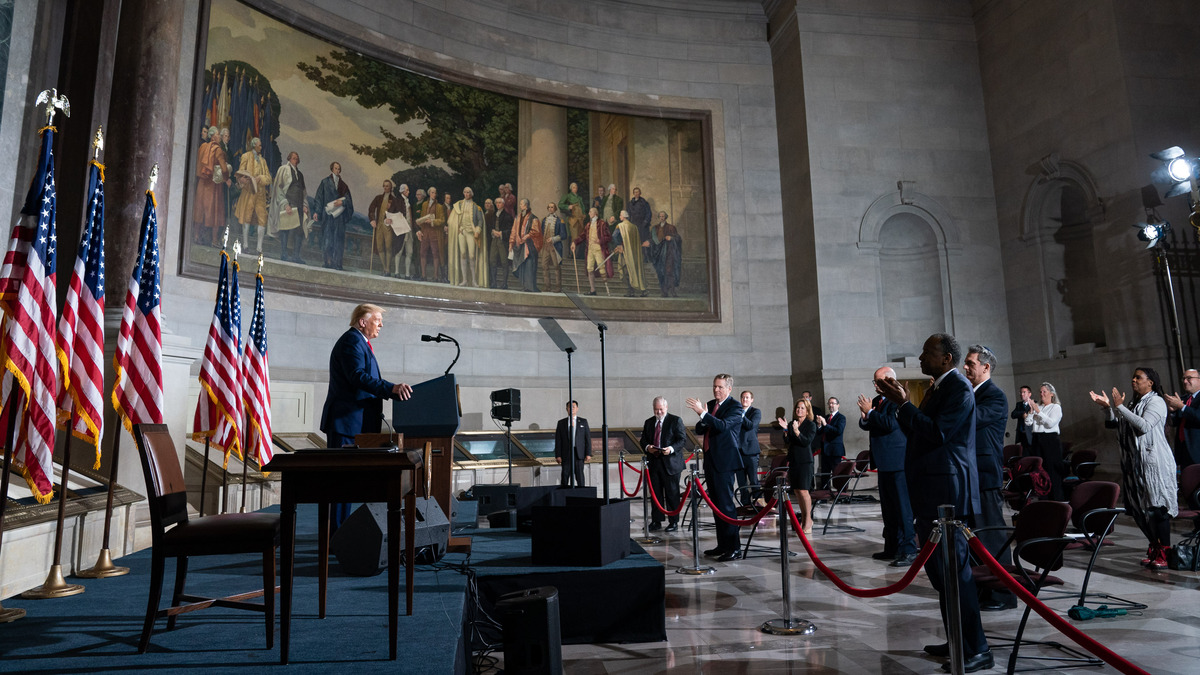
Matthew Spalding, vice president of Washington operations and dean of the Van Andel Graduate School of Government, hopes the curriculum will present honest history to American students. The curriculum provides lesson guidance on its website for parents and teachers of students in kindergarten through the 12th grade.
The curriculum differs from New York Times’ 1619 Project, which claims that the institution of slavery has touched all aspects of American life, rendering it necessary to “reframe the country’s history.”
However, Hillsdale College President Larry P. Arnn said that the college began creating the curriculum long before The 1619 Project emerged. He said that work on the curriculum began at least 40 years ago.
While former President Donald J. Trump’s 1776 Commission on Patriotic Education included Arnn as chair and Spalding as executive director, Spalding said the 1776 Curriculum is unrelated.
The 1776 Curriculum offers a different perspective from The 1619 Project, but it also teaches the darker aspects of American history and how the nation has overcome them. As stated on its website, the curriculum focuses on “America’s founding principles, which have outlasted and extinguished from law various forms of evil, such as slavery, racism, and other violations of the equal protection of natural rights.”
The creator of The 1619 Project, Nikole Hannah-Jones, argued that “our democracy’s founding ideals were false when they were written.”
The National Education Association, the largest public teachers’ union in America, distributed The 1619 Project to teachers across America. According to The New York Post, the NEA has recently announced that it will be promoting critical race theory in 14,000 school districts across the nation.
Spalding said this debate is not about history, but is the result of a movement to “read history backwards.”
“Their approach is illegitimate, and they’re not only using history as a foil,” Spalding said, “but they’re using it as a foil to fight and see everything through the eyes of race, which is even more problematic.”
The 1776 Curriculum, on the other hand, seeks to provide a “knowledge and understanding of American history and of the American republic as governed by the Constitution and morally grounded in the Declaration of Independence,” as found on the curriculum’s website.
Arnn said that America is built around a declared set of principles at its founding. America’s founding principles posed a challenge to people of the past, just as they pose a challenge to people in the present, he said.
“The first principle is a form of the law of contradiction: A thing happened in the past, or else it did not,” Arnn said. “Once it is past, it cannot change.”
Arnn explained the importance of an accurate portrayal of history.
“One finds out about the principles, choices, and events of the past by reading the record of the past,” Arnn said. “That must be presented fully and fairly.”
The college intends for the curriculum to educate American youth on their nation’s principles.
“The principles of our country place us, the people, in charge of it,” Arnn said. “We should understand the thing we are supposed to manage.”
He explained that as a consequence of this curriculum’s release, youth across America will better understand the meaning of their nation.
“One of the things that we must study to be educated is human nature,” Arnn said. “One cannot study human nature without studying government.”
Assistant Provost for K-12 Education Kathy O’Toole said the college has long tested and tried this curriculum in its Barney Charter Schools.
“We just took the same history and government things that are being taught in those schools and we made them available to the general public,” she said. “People need resources for teaching American history and government well.”
She said that the curriculum contains primary source documents, sample tests, quizzes, and key terms as teacher resources.
“The result is a curriculum that is 2,400 pages long, and there’s more on the way,” O’Toole said. “Of course, American history started before the founding, and we’ve got curriculum on everything before and after coming out over the course of the next year.”
O’Toole said the 1776 Curriculum is an attempt to help people look into American history as a whole in an apolitical way. She expressed her belief that the majority of Americans want to take history seriously.
O’Toole wrote in a letter to teachers that the 1776 Curriculum presents America as a nation “unprecedented in the annals of human history” for the degree of freedom, prosperity and peace available to citizens and immigrants alike.
Spalding said the 1776 Curriculum has the ability to bring honest civics education to America’s youth.
“We thought it was crucially important to provide a model, an excellent model of a curriculum, as an alternative,” Spalding said. “We think that curriculum really speaks for itself, and will attract a lot of schools, homeschoolers, and teachers to it because it’s not laden with current politics and ideology.”
Spalding said a civics education is crucially important in any free country, as the populace must be educated about their nation’s history and government. The teaching of history should be “fact-based, honest, and accurate,” showing students both the good and bad sides of historical events.
“The pursuit of truth is an unapologetic pursuit,” O’Toole said. “For those who strive for honesty, it cannot be otherwise.”

